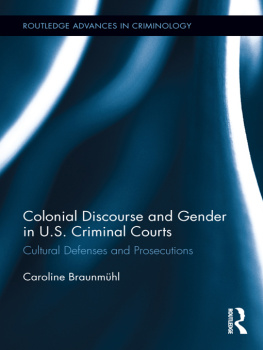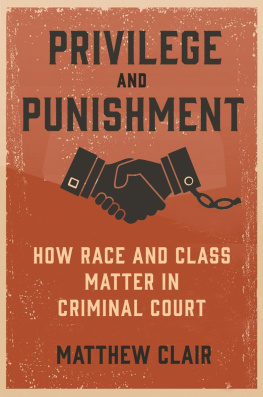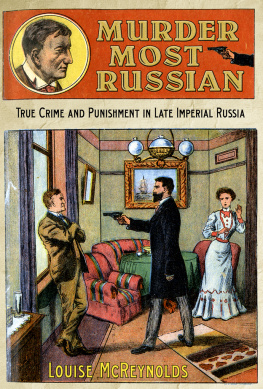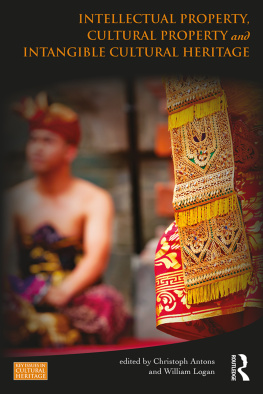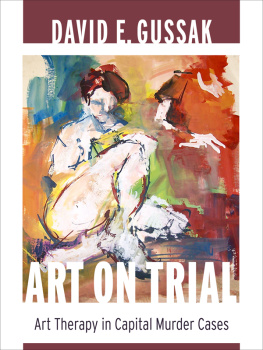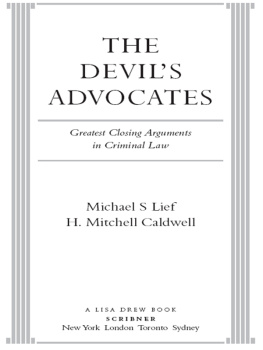Colonial Discourse and Gender in U.S. Criminal Courts
Routledge Advances in Criminology
1 Family Life and Youth Offending
Home is Where the Hurt is
Raymond Arthur
2 Chinas Death Penalty
History, Law, and Contemporary Practices
Hong Lu and Terance D. Miethe
3 The Politics of Antisocial Behaviour
Amoral Panics
Stuart Waiton
4 Hooked
Drug War Films in Britain, Canada, and the United States
Susan C. Boyd
5 The Violence of Incarceration
Edited by Phil Scraton
and Jude McCulloch
6 Violence, Prejudice and Sexuality
Stephen Tomsen
7 Biology and Criminology
The Biosocial Synthesis
Anthony Walsh
8 Global Gambling
Cultural Perspectives on Gambling Organizations
Edited by Sytze F. Kingma
9 Social Class and Crime
A Biosocial Approach
Anthony Walsh
10 Security and Everyday Life
Edited by Vida Bajc
and Willem de Lint
11 Women and Heroin Addiction in Chinas Changing Society
Huan Gao
12 Colonial Discourse and Gender in U.S. Criminal Courts
Cultural Defenses and Prosecutions
Caroline Braunmhl
Colonial Discourse and Gender in U.S. Criminal Courts
Cultural Defenses and Prosecutions
Caroline Braunmhl
First published 2012
by Routledge
711 Third Avenue, New York, NY 10017
Simultaneously published in the UK
by Routledge
2 Park Square, Milton Park, Abingdon, Oxon OX14 4RN
Routledge is an imprint of the Taylor & Francis Group, an informa business
2012 Taylor & Francis
The right of Caroline Braunmhl to be identified as author of this work has been asserted by her in accordance with sections 77 and 78 of the Copyright, Designs and Patents Act 1988.
All rights reserved. No part of this book may be reprinted or reproduced or utilised in any form or by any electronic, mechanical, or other means, now known or hereafter invented, including photocopying and recording, or in any information storage or retrieval system, without permission in writing from the publishers.
Trademark notice: Product or corporate names may be trademarks or registered trademarks, and are used only for identification and explanation without intent to infringe.
Library of Congress Cataloging in Publication Data
Braunmhl, Caroline.
Colonial discourse and gender in U.S. criminal courts : cultural defenses and prosecutions / by Caroline Braunmhl. 1st ed.
p. cm. (Routledge advances in criminology ; 12)
Includes bibliographical references and index.
1. Sex discrimination in criminal justice administrationUnited States. 2. MinoritiesLegal status, laws, etc.United States. 3. United StatesPolitics and government. 4. ColoniesLaw and legislation. I. Title.
HV9950.B73 2012
347.73008dc23
2011039708
ISBN13: 978-0-415-89925-3 (hbk)
ISBN13: 978-0-203-12375-1 (ebk)
For Dirk von Braunmhl
my brother, whom I would have chosen among thousands
and in the name of solidarity among the many who struggle,
in one way or another, for radical social transformation.
Contents
PART I
Introduction |
PART II
Theoretical Perspective |
PART III
The Corpus of Cases |
PART IV
Ethnicizing Prosecutions and Defenses: Culture and Gender in Trial Parties Argumentative Strategies and in the Debate About the Cultural Defense |
| 1. |
| 2. |
| 3. |
| 4. |
| 5. |
PART V
Resistance/Instabilities: The Spectrum of Discursive Politics in Trials Involving Cultural Evidence and the Involuntary Subversion of Hegemonic Discourse |
| 6. |
| 7. |
| 8. |
PART VI
Conclusion: Practical/Theoretical Implications |
Acknowledgments
My first debt goes to the organizations that have generously funded my researchthe Deutsche Forschungsgemeinschaft / German Research Foundation ( DFG ), covering the period of 2000 to 2003, and the German Programm zur Frderung der Chancengleichheit fr Frauen in Forschung und Lehre , whose funding has covered two periods between 2004 and 2006. Next, I wish to thank two successive generations of supervisors and examiners of the PhD thesis upon which this work is based: Professor Dr. Klaus F. Geiger, who has provided wonderful supervision and support for the project from its inception, Professor Dr. Andreas Gestrich and his colleagues and former students at Trier University; Professor Dr. Susanne Krasmann, Professor Dr. Stephan Moebius, Professor Dr. Paula-Irene Villa, Professor Dr. Urs Stheli, Professor Dr. Antje Wiener, and Prof. Dr. Christine Landfriedwho have made it possible for me to earn the PhD degree after I had abandoned the project temporarily. I thank scholar of law Professor Kenneth B. Nunn for commenting upon a legal interpretation I offer in this booka comment I have taken to heart even as I maintain a different opinion from his. I also thank my editor at Routledge, Max Novick, for believing in this book as well as for valuable advice and support. I am grateful to Carey Nershi of IBT Global and to all other persons who have contributed to the production of this book, even as I do not know their names. Further, I want to express my gratitude to the following persons for support and sustenance of intellectual as well as emotional kinds: Peter Grnert; my extended family, including Patrick, Hilde, and Carlchristian von Braunmhl as well as Aja Klemm; Steffi Benner, Pavel B. Jiracek, Manuela Pelz, Franzis Daniela Gro, Petra Gtgemann, Thomas Scholz, Norman Heinrich, Marion Lawendel, and Marie-Theres Federhofer, along with countless others who have accompanied and inspired me from more afar. Dorsie Black has accommodated me repeatedly during my research stays in the U.Sand in more ways than just literally: thank you! Last but not least, although I cannot name them all individually, I want to thank in anonymous form the numerous attorneys (at both prosecutors and defense attorneys offices), as well as one judge, one former defendant, and his mother, for kindly providing me with many of the materialstranscripts and appellate briefsupon which this study is based.
Quotations from the following publication are reproduced in this book with the permission of its author, Leti Volpp, and of Harvard University / Law School:
Leti Volpp. 1994. (Mis)Identifying culture: Asian women and the cultural defense. Harvard Womens Law Journal 17: 57101.
Quotations from the following publication are reproduced in this book with the permission of its author, Leti Volpp, and of the Columbia Law Review Association, Inc.:
Leti Volpp. 1996. Talking culture: gender, race, nation, and the politics of multiculturalism. Columbia Law Review 96: 15731617.
Part I
Introduction
[E]ducation for social change is not so much about new information as it is about disrupting the hegemonic ways of seeing through which subjects make themselves dominant.
Razack (1998, 10)
This study offers a close reading of several U.S. criminal trials in which cultural evidence was presentedor, put differently: discourses of cultural difference. The debate about what has come to be termed the cultural defenseconducted for the most part in law reviewshas focused on the question of whether or not that defense should be permitted in one form or other. In contrast, I am here concerned with how such evidence is actually put to work at trial. In doing so, I include what has been systematically overlooked in the debate, and is in fact obscured by the very term cultural defense around which it has taken shape: cultural evidence presented by the state to prove a criminal defendant guilty as charged.

